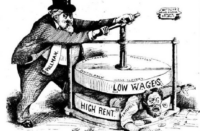The author Anna Burns from Belfast has won the 2018 Man Booker Prize for her novel Milkman. The chairperson of the judges, the philosopher Kwame Anthony Appiah, described it as “incredibly original,” saying that “none of us has ever read anything like this before.”
Burns is the first winner of this award from the North of Ireland, previous Irish authors being Iris Murdoch, Roddy Doyle, John Banville, and Anne Enright.
Any novel about the Troubles makes a statement feeding into the way history will record those times, how new generations will see them. Not only is there an Official Version, there are also the real experiences of both communities, and various versions within each of these. Milkman must be seen in this context.
Milkman reads like a dystopian novel. We are in a time and place where names are not mentioned, places not named, people referred to in terms of their relationship to the anonymous narrator, or by another designation. Almost everything is expressed indirectly, by innuendo. In this way the narrative style of the novel reflects the coded talk of Belfast, where names reveal an either-or identity, and pronunciation is shibboleth.
The world presented is both dystopian and Belfast at the same time, specifically Catholic working-class Ardoyne, in the 1970s, because those times were as horrendous as they are described here. Anna Burns conveys this, highlighting the madness by using a surreal narrative style. She also goes off on frequent tangents before returning to the main storyline. This can make for challenging reading on the one hand but also earned the judges’ assessment on the other.
Ardoyne is a Catholic enclave in Protestant north Belfast, one of a number of Catholic areas that are completely isolated and therefore more vulnerable. Ardoyne is written into the novel in many ways, in the unnamed geographical detail and, above all, in the way people speak.
The title itself expresses the book’s Belfast and North of Ireland theme. Milkman refers to the clandestine transporting of explosives in milk crates into the Catholic areas.
Of course the word “Catholic” is never used, nor is “Protestant.” Instead there are “renouncers-of-the-state” and “defenders-of-the-state,” those who look “across the border,” the others “across the water.” The suggestion is that the micro-culture of everyday life is the same in both communities. However, the narrator expresses the experience of the nationalist working-class community. Reflecting general incorrect usage, the narrator refers to the two Christian denominations as opposite religions. The twain only meet in the city centre, in “mixed” bars and, unexpectedly, in the French evening class. Here the teacher struggles to get students to see the apparently familiar differently. Indeed the students are sent out to really look at a sunset—the only vivid colour in the novel, the colour that defines the book’s striking cover.
Milkman himself is a 41-year-old paramilitary sexual predator, who is stalking our narrator. She is the 18-year-old daughter of a widowed working-class mother in this particular community. It is a community under siege by the British state and its “defenders.” However, the narrator is explicitly on the margins of this community, and this is her viewpoint. She does not relate the experience at the centre of the community, which is probably why the novel has not been happily received by all. Her viewpoint is that the “renouncers” have control over her, as they have over the entire community. She is not involved in the activity of the “renouncers,” yet there is little she can do to separate herself, live an independent life.
Milkman and another paramilitary pursue her, indeed attempt to coerce her. At the same time the narrator does not hide the fact that this crazy situation results from the aggressive, humiliating and controlling treatment of the community by the armed forces of the occupying state.
The absence of colour, of smells, and taste, is very noticeable. People in this place and at this time do not experience life fully. This is a half-life in the shadows, a deprived life, diminished in what life should be, by severe restrictions, curfews, unnerving total observation by state and “renouncers,” brutality and violent deaths. Indeed killings and deaths resulting from the all-pervasive violence far outweigh natural deaths. Every family here has lost at least one relative, frequently more.
Readers who remember those days know how true this feels. Even children cannot imagine non-violent deaths. However, the novel does not describe these graphically. Not the violence is shown but its effect on the people within the community, its toll on their personal freedom and entitlement to human living.
Part of this dystopian feel of greyness and absence of humane living is the novel’s statement that people feel unentitled to happiness, especially to a fulfilling, loving relationship with a partner. Relationships are broken off when partners get too close. This adds significantly to the feeling of a life that is lived on the margins, an incomplete life. Only the burst of colour when the students of the French class are sent to really see the sun set over Belfast Lough indicates at this level that another way of life is possible. And it is cross-community.
Despite the sense of entrapment, some of the community who people this novel rebel, and some do look for happiness. The narrator is known for reading books while walking, books that are removed from the twentieth century. She wants nothing to do with this reality around her and actively tries to separate herself from it. This is not entirely successful. Others who stand out for resistance are women—including the traditional housewives who break the curfew and engage in bin-lid banging to alert neighbours to danger. Early feminists also make an appearance in the story.
Milkman is a reminder of the bad old days. It documents aspects of the working-class experience of the Troubles. Other experiences, like that at the centre of the community, are not Burns’s theme. This novel reflects in a surreal tone the experience of a young woman on the periphery of her community, where she was not entirely on her own. It is an experience that was defined by the military force of the state and the responses such violence creates in the besieged population.






